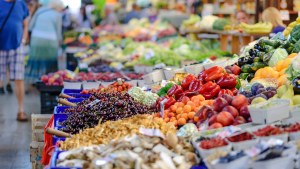The Dark Side, More Peas, Please, and Flooded Grain
Check out our roundup of the week's top news and research in food, agriculture, and global development.
Top Story
EU Deforestation Rules Upset Global Producers
New European Union rules require proof that crops were not grown on deforested land—and the world’s largest agriculture producers are not happy about it. Complying with the new rules could be complicated and expensive, thus producers warn that consumers might end up footing the bill through higher food prices. However, the rules will help fight climate change and biodiversity loss and could lead to long-term environmental benefits.
Council Insights
More than Calories
The world needs a healthier food environment that is easier for everyday people to navigate in order to achieve nutrition security, argues Research Assistant Kailey Griffith in Global Food for Thought. Read the full blog on our website.
 Food and Agriculture
Food and Agriculture
Food and Agriculture
Corn Concerns
The US produces more corn than any other crop, selling $5.3 billion to China last year alone. However, China has been engaging with other producers and is looking into ways to be self-sufficient in the long run, which could leave a significant gap in America’s export market.
More Peas, Please
The frozen pea, a staple in British cuisine during the 1970s, is seeing a resurgence in popularity as food prices rise and consumers seek cost-effective options. Britain's vegetable producers are capitalizing on this trend, noting that frozen foods can offer value during current economic challenges.
Flooded Grain
Heavy rainfall is battering northern China—the primary grain-producing region—displacing over a million people and causing at least 30 deaths. The resulting flooding threatens China's food security, especially since the northeastern provinces produce over a fifth of the country's grain.
Deeper Dive
Inflation Race
Food inflation is not isolated to Britain; countries around the world are suffering from record high prices. Although food inflation has been slowing in recent months, it is still much higher than it was a year ago, with costs climbing at a faster rate than normal.
Resilience
Sustainable Ag
Ecosystem-based adaptation—a strategy for the integrated management of land, water, and living resources—allows farmers in India to harness biodiversity and natural resources to mitigate the effects of climate change. This approach can enhance food security and diversify income sources through methods like multilayer farming.
DC Report
Almost, but Not Quite
President Biden said he has "practically speaking" already declared a climate emergency. He referenced his administration's conservation efforts, the decision to rejoin the Paris Climate Accord, and the allocation of approximately $368 billion in the Inflation Reduction Act for a clean energy economy. While climate activists believe that an official declaration would grant the president more executive powers to address climate change, Biden has yet to make a formal declaration.
Big Actors
The Dark Side
An entirely new city named Neom is being built on the Red Sea coast, and is teaming up with a Dutch greenhouse company to create a “synthetic climate” and turn the desert into an agricultural powerhouse. But there’s a dark side to the project—part of the site is home to the Huwaitat tribe, who are now facing eviction and destruction of their sacred land.
Big Ideas
Weeds as Fuel
Scientists are exploring the use of non-food plants as alternatives to corn and soybeans for biofuel production. CoverCress, developed from a plant once considered a weed, is one of three nonfood cover crops that could produce renewable fuels without competing with food sources.
Ask an Expert
What’s happening to the population of Black farmers in the US?
"In 1920, Black farmers numbered more than 900,000, representing about 14 percent of all US farmers, according to census figures compiled by the US Department of Agriculture. By 2017, the USDA reported that America had only about 49,000 Black farmers, accounting for just over one percent of all producers, working 4.7 million acres, down from about 16 million acres a century earlier.”
—Senior Fellow Roger Thurow in GFFT


Have a question about food and agriculture? Ask one of our experts at the Center on Global Food and Agriculture to get an answer in next week's Global Food for Thought!
Council Events
Did you miss one of our previous livestreams? Don't worry! They are all available on our website to watch at any time.
Other Upcoming Events
Summer Networking Event for Small Businesses
Date: August 15
Time: 6:00 – 8:00 p.m. CT
Introduction to Aquaponics
Date: August 19
Time: 10:00 a.m. - 12:00 p..m. CT
IFAD at the Global Environment Facility Assembly
Date: August 22 – 26
Natural Dyes 3D with Soul Fire Farm
Date: September 7
Time: 10:00 a.m. - 4:30 p.m. ET
iSEE Critical Conversation 2023: Climate-Smart Agricultural Practices and Resilience in the Midwest
Date: September 18
Time: 4:00 – 6:30 p.m. CT
Land Acknowledgement Statement
The Center on Global Food and Agriculture recognizes it occupies the ancestral land of the Kiikaapoi, Peoria, Kaskaskia, Bodwéwadmi, and Myaamia people. Indigenous communities around the world disproportionately experience the pressures of climate change, global conflicts, and the COVID-19 pandemic, while simultaneously stewarding 80 percent of the world’s biodiversity. These Indigenous tribes and nations are the original owners of this land and continue to be systemically erased by policies and practices that ignore their histories. To learn more about Indigenous foodways and practices, check out our 2022 blog series "Stewardship, Sovereignty, and Solutions."
Related Content
- Embracing Dandelions as Food and Medicine
- Going Beyond Regenerative Agriculture on Tribal Lands
- Expanding "638" to Enhance Native American Food Sovereignty
- Flavors and Culture: Food Systems Through Indigenous Women's Eyes
- A Thanksgiving Legacy: Fighting for Indigenous Food Sovereignty
- Native Food Sovereignty: Strengthening Connection to Culture
- Reconnecting to Indigenous Food Sovereignty Values and Practices
- Embracing Interconnectedness: How Indigenous Foodways Can Save Us




